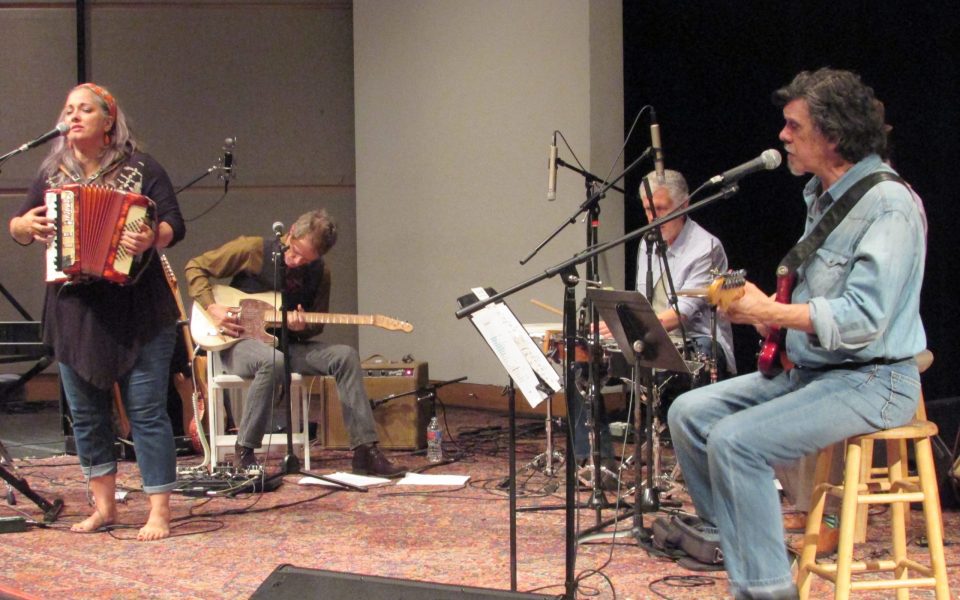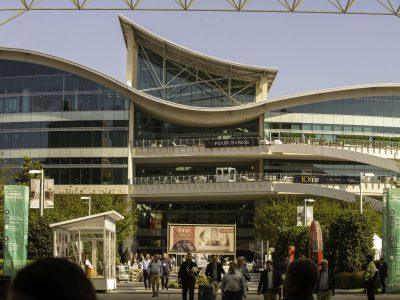by Jordan Green
“I am full of questions, searching for solutions,” Beth McKee sings on “Break Me Down,” the second track on her new album Sugarcane Revival. “Believing I will make it if I can find my confidence. Nobody said it’s easy to fight against the current. I chose this direction, I’ll take all the consequences. Rowing up the river of doubt, I’m about to wear myself out.”
The themes of willful independence and communal resilience abounding in the new album also sum up the spirit of New Orleans 10 years after the landfall of Hurricane Katrina. Likewise, they’re a pretty fair characterization the group of talented musicians McKee drew together to mark the anniversary at the Southeast Center for Contemporary Art, or SECCA, in Winston-Salem on Aug. 29.
A native Mississippian, McKee has lived in different parts of the South. While honing her skills on the accordion in Austin, Texas in the late ’80s, McKee landed a job with the band Evangeline, allowing her to move to New Orleans. The band inked a deal with Jimmy Buffet’s Margaritaville imprint for MCA Records, and became a fixture on the local club scene. And while she eventually moved to Orlando, Fla. to live with her husband, Juan Perez — who is also her longtime and current drummer — McKee has maintained an enduring and affectionate relationship with New Orleans and southern Louisiana.
Reflecting on why she continued to develop her talents as a singer, musician and songwriter after her bandmates in Evangeline decided to quit, McKee said, “I was the only one who didn’t mind being poor.”
Like New Orleans, Winston-Salem is a home away from home for McKee and Perez. Her sister has a house on the Yadkin River outside the city, and every summer for a couple weeks, McKee and Perez take up residence in the garage apartment. Winston-Salem serves as a base of operations for gigs in Asheville and Durham. While McKee sat for an interview on the front porch last week, Perez busied himself with a woodworking project in the garage.
Deborah Randolph, who relocated to Winston-Salem with her husband as a Katrina evacuee, had approached McKee with the idea of hosting a party at SECCA, where she serves as curator of education, to commemorate the anniversary of the storm.
“New Orleanians, when they’re sad or there’s something heavy, they throw a party,” McKee said. “We put some food out and bring in some musicians to play.”
McKee pulled in Tommy Malone, a New Orleans guitar player, vocalist and songwriter, for the musical gathering. Randolph introduced her to Jeffrey Dean Foster, a local singer-songwriter. During rehearsals for the Katrina anniversary concert, Foster and Perez bonded as musicians who supplement their income with house painting.
Foster texted Perez a photo of a fresh coat of paint on a baseboard.
“That’s a master stroke!” Perez texted back in admiration.
As the musicians shared the anecdote onstage at SECCA, Foster joked, “My true profession.”
Malone, seated across the stage with an electric guitar balanced on his knee, chimed in.
“Hey, I’ve pushed a paintbrush,” he said. “And I’m not talkin’ about the fine arts.”
The four musicians, who were joined by Colin Allured on bass and acoustic guitar, are all old enough to have grown children in college. As artists working in the various rivulets of Southern blues, country, pop and rock-and-roll music over the past three or four decades, they share a stubborn vision and a knack for eking out rarified beauty from music careers that haven’t always delivered financial rewards.
Perez abetted the three singer-songwriters as an expert percussionist, able to transition with ease from Latin to country and R&B, combining with Allured on bass as a pro rhythm section. The three singer-songwriters, each an excellent instrumentalist, showed that dedication to craft and joy in the communion of making music with friends while paying homage to their forebears can repeatedly yield stunning moments of soul-baring artistry.
There it was in the lustrous and richly textured vocals McKee rendered for new songs like “Promised Land” and “Abraham and Alice,” or her accomplished piano playing which effortlessly moved from the rollicking syncopation of Professor Longhair to the torn-and-frayed pop of early ’70s Elton John.
It was evident in indomitable and sassy vocal of “Long Road Back,” the lead track from her new album. While the lyrics reflect McKee’s ambivalent relationship with her home state, they easily take on a new meaning as a mirror for the homesick Katrina evacuees unable to return to flood-damaged houses.
“When I get back home I wonder who I’ll see,” McKee sang. “Won’t be no yellow ribbon tied around no tree/ Nobody’s gonna be there waiting for me/ It’s a long road back to where I’m from/ Seven hundred Sundays in the twilight zone/ I’m a prisoner condemned to roam.”
For Foster, the rarified beauty snatched from privation came in an acoustic version of “Life Is Sweet,” a song from his new album The Arrow that he noted is generally played “turned up to 11.” Joyous vocals delivered with Replacements-like verve accompanied muted chords that suddenly exploded in reverberation, both percussive and infectiously melodic. They underscored the song’s coup de gras: “Life is sweet, but it doesn’t last.”
And whether paying homage to his hero Ry Cooder on “How Can A Poor Man Stand Such Times and Live?” or performing “Natural Born Days,” a song about his mother, Malone nailed his material with devastatingly soulful vocals and killer guitar solos.
The jam session that culminated the concert provided the most revelatory moments, whether it was a minor-key reworking of “When the Saints Go Marching In” or a raucous and uplifting cover of Hank Williams’ “I Saw the Light.”
There was one moment when Malone needed to be reminded of the words of a verse in the Bobby Charles classic “Jealous Kind,” but even his banter with McKee as they worked it out was soulful.
“This is a full-tilt, New Orleans-centric jam session, which means all mistakes are part of the deal,” McKee said.
Perez corrected her.
“There are no mistakes,” he said.
Join the First Amendment Society, a membership that goes directly to funding TCB‘s newsroom.
We believe that reporting can save the world.
The TCB First Amendment Society recognizes the vital role of a free, unfettered press with a bundling of local experiences designed to build community, and unique engagements with our newsroom that will help you understand, and shape, local journalism’s critical role in uplifting the people in our cities.
All revenue goes directly into the newsroom as reporters’ salaries and freelance commissions.





Leave a Reply